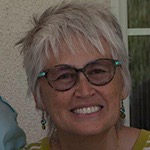We Here
An Indo’s story is camouflaged
between the dutch grandfathers’
“Hou je mond.”
and the Indonesian grandmothers’
“Tahan mulutmu.”
Do not speak of the horrors
your grandmothers and mother endured,
whitewashing their dark skin
through the wringer of Dutch priviledge,
claiming a small piece of equality
hoping to erase their subservient status
by way of marriage to a light-skinned-christian man
War came,
the men left,
called to fight for Her Highness, Queen of Holland.
Under the Japanese occupation,
the women were incarcerated,
relegated to the kampong,
their efforts to exchange shreds of frowzy fabric
for just one pisang, one egg or
one bite of lumpia
were rewarded by wrist-hanging
and whipped until blood dripping,
trickled into the moist tropical soil
these sister internees endured
births of fatherless half-babies,
these daughters were swallowed by starvation,
some had their hands cut off,
caught stealing a handful of rotting rice.
When the allies’ planes
thundered into the spiritless dank sky,
hope renewed
women held each other
and cheered the pilots on,
even as their Japanese captors
struck them down
with the barrels of their weapons
When liberation came
so many learned what they did not want to hear
“Yes, he died, two, three, maybe four years ago.”
disimprisonment came,
but it did not come for the dutch,
our Indo soul was renewed,
but our Dutch selves were despised
in the same breathing,
we were oppresor and oppressed
Both my parents survived many horrors,
only to endure
an uncertain future at the hands
of the new national revolution.
Fear called in the middle of the night
with loud raps at the door.
Young locals,
armed with knives, pistols and rifles
ransacked the house regularly.
My mother kept the last of the cash
under my sleeping baby sister’s head.
My mother gambled well.
The looters would stop at the crib,
“Viese kind” they’d mock
(dirty because she was mixed race)
and left her undisturbed.
During the day,
my mother rode her bicycle
to make doctor’s visits for
her two sick sons.
Bullets whizzed by her head.
Each trip, every other day,
and finally the note,
found on the front door,
“Leave now. Next time we will not miss.”
Tickets were immediately purchased.
My mother, six months pregnant with me,
my father, my two brothers and one sister,
boarded a ship to return to a homeland
none had ever seen before.
A homeland determined by the patriarchal bloodlines,
of my two grandfathers.
My family “repatriated” to the Netherlands.
Yes, four and five generations ago
my family colonized the Dutch East Indies,
treated the indigenous as less than,
exploited all of its riches, and the fruits of their labor.
I am Indo Dutch
with roots in two countries,
two heritages,
two stories.
I feel the pain of both,
so do my parents,
missing Java, the land of their birth.
But we do not speak of this,
hou je mond
tahan mulutmu
Now we say,
“hold your tongue!”
Forgetting our legacy,
we continue to bleed,
disfigured by unspoken memories,
wounded by the unconscious pain.
Even in this promised land called America,
we hear,
“hou je mond”
“tahan mulutmu”
and
“Go back to where you came from!”
I ask you,
where is that place?
where do We belong?
~ Anke Hodenpijl

Anke Hodenpijl is a bedside singer, poet, gardener and safe spot for animals. She is inspired by nature, family, history, friendships and unfinished stories. Mostly, she is a grateful person.
Dear Anke,
I found your beautiful, poignant, powerfully vivid poem to be deeply moving.
Thank you.
Nelson Varon